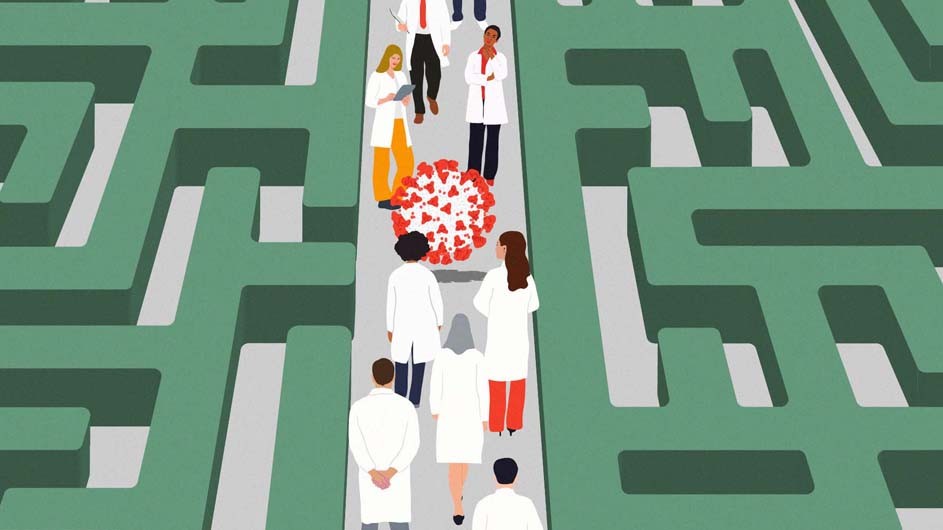How the Pandemic Ignited a New Wave of Scientific Collaboration
COVID-19 has shown that coordinating efforts across all aspects of science are vital to the success of our fight against this infectious disease.

The pandemic has vividly demonstrated the value of real-time cooperation, data sharing, and other ways of gathering the collective power of our scientific minds—in effect, the democratization of scientific discovery.
Researchers had their world turned upside down by the novel coronavirus. At the Herbert Irving Comprehensive Cancer Center, research conducted in our laboratories, from cell cultures to supercomputers, had to be largely put on hold. Everyone except those essential to keeping the labs and their experiments alive were instructed to work remotely and focus was redirected toward COVID-19.
It may seem odd that researchers concentrating on cancer, which is not contagious, would be pressed into the fight against a disease that spreads easily and in ways we still do not fully understand. But within a few weeks, Columbia cancer researchers and pathologists had developed a way of detecting COVID-19 antibodies that won quick approval for testing from New York health authorities.
Our data scientists also began studying the makeup of COVID-19. Researchers at the cancer center took the systems their teams developed to understand cancer genetics and how tumors develop over time, tapped into a 500,000-patient database in Britain, and applied it to discovering people’s predispositions to COVID-19.
Why, for example, do some patients who test positive have severe symptoms and even fatal ones but others do not?
Other cancer researchers at Columbia and elsewhere focused on the development of a vaccine for COVID-19. Cancers in many ways behave like viruses. Viruses and cancer cells are both very smart at the deadly game of mutating as a way to escape immune mechanisms and developing new resistance to therapies. They are similar in their ability to co-opt the genetic programs resident in normal cells and normal tissues.
Cancer researchers also have long studied vaccines, because certain viruses such as hepatitis B and human papillomavirus (HPV) can cause cancers. The coming together of the scientific community across specialties and the interdisciplinary cooperation and national coordination that it spurred are indispensable in dealing with all public health threats, whether they are immediate like COVID-19 or more long-term like cancer or heart disease.
In the face of the pandemic, traditional barriers around science have been broken down. Researchers are quickly collaborating with others who are working on the same problems, and with local, state, and national government agencies. They have been sharing data in real-time, before papers can be published and credit claimed for advances. We’re seeing an increased amount of research preprints, which in the academic world signals a cultural shift, enabling scientists to read and discuss research before it lands in the pages of a scientific journal. This is happening via free online platforms like bioRxiv and the like, helping scientists across disciplines forge more rapid connections.
That kind of all-hands-on-deck approach does not eliminate the need for rigorous data collection and peer review of findings. We got a sad reminder of that not long ago, when two scientific journals were forced to retract two huge COVID-19 studies because the underlying data could not be verified. Still, the benefit of this type of rapid sharing of evolving scientific ideas is unquestionable, particularly in the face of a pressing, deadly problem like SARS-CoV-2.
With care and scientific rigor, we can be synergistic in our work and not just additive. We can all act through institutions and government agencies to bring people together from different backgrounds and disciplines. And, perhaps most important, we must continue to share data—as much of it in the public domain as possible—while respecting publications, grants, intellectual property rights, and patents.
There is reason to be optimistic. Academic institutions are increasingly aware that collaborations should be a criterion for recognition and promotion in faculty ranks. Government agencies and foundations that provide grants are accepting the fact that there can be several leaders on a particular grant, be it small or large. The vaccine for COVID-19 may become one of the most rapidly developed vaccines in history, thanks to expedited regulatory processes and testing and internationally coordinated research efforts.
Democracy is about individual rights, but the power of the individual is nothing when compared to the power of the collective in a crisis. In the face of the COVID-19 pandemic, we have seen how individuals coming together, rapidly and broadly disseminating new research findings, knocking down traditional silos, and sharing information started to turn the tide in the war against this common enemy. We would do well not to forget this lesson.
Anil K. Rustgi is the director of the Herbert Irving Comprehensive Cancer Center at NewYork-Presbyterian/Columbia University Irving Medical Center. Dr. Rustgi is a world-renowned leader in the field of gastrointestinal oncology.